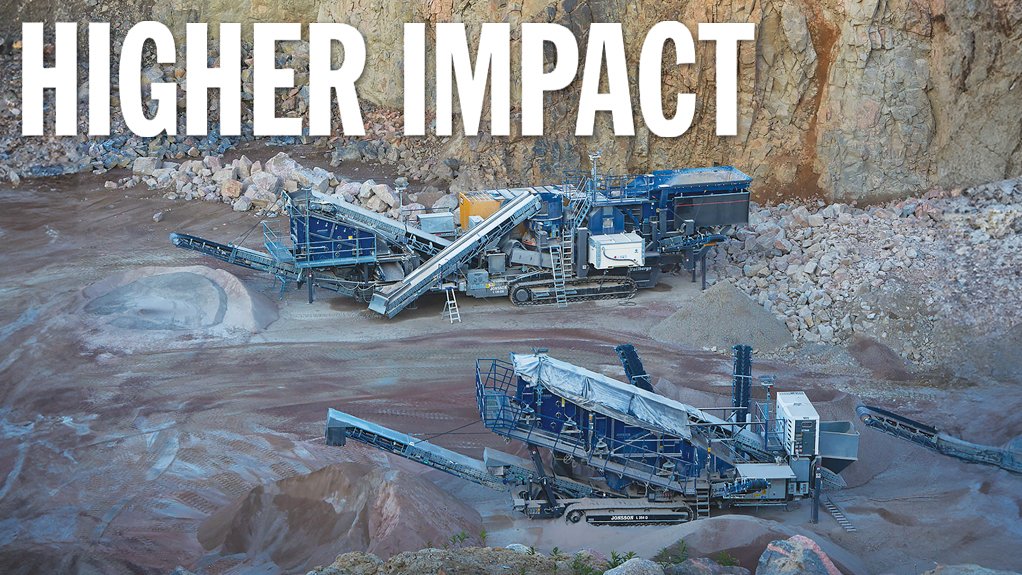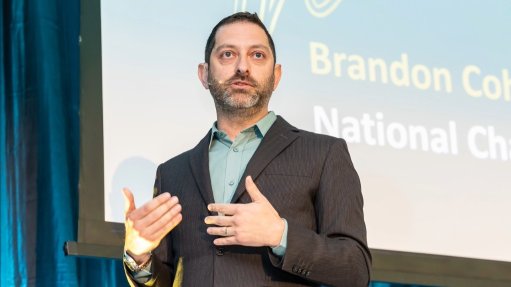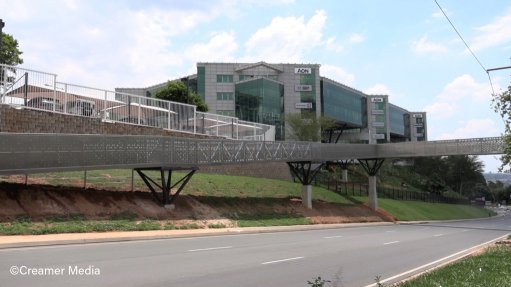Mining companies, suppliers team up to advance evolving ESG goals
The South African mining industry continues to be a key contributor to the fiscus, with local producers and suppliers paying about R14-billion in royalties and R90-billion in taxes in the year ended December 31, 2023, and investing billions of rands in environmental, social and governance (ESG) initiatives.
In its integrated annual review for the year, Minerals Council South Africa CEO Mzila Mthenjane says mining stakeholders continue to strive for meaningful impact in the lives of employees and communities in South Africa, particularly as the country grapples with low economic growth and unemployment.
Despite lower profitability in the year, owing to macroeconomic and global factors, the mining industry still paid out R179-billion to its 479 111 employees, which was 9.1% more than in 2022, and outpaced the 5.4% year-on-year rise in compensation in nonmining sectors.
The financial performance of the world’s top 40 mining companies was pressured by decreasing commodity prices and rising costs, while revenues decreased by more than 7% year-on-year for these companies in 2023, with 2024 seemingly promising a continuation of these trends.
South African mining companies, comprising 60% of formal employment in the mining sector, nonetheless spend about R2.3-billion on socioeconomic development every year, as well as R5.1-billion on training and development, with an estimated value of between R13 500 and R21 700 for each full-time employee.
Mthenjane previously told Engineering News & Mining Weekly that mining’s social impact through the provision of jobs and wages, as well as investment in the education and training of employees and communities, coupled with social projects, is often unappreciated in the economy.
With the industry producing many of the minerals required for green energy and green technology, including vanadium, copper and manganese, mining companies are striving to do so responsibly and with due regard to ESG aspects.
For example, the mining industry consumes about 30% of the power generated in South Africa, but miners and suppliers are developing a combined 16 000 MW of renewable energy to mitigate environmental impacts from coal-fired power generation.
The Minerals Council reports there has been a sharp increase in ESG regulation and expectations in the last year, with a greater focus on water conservation and biodiversity preservation in particular. It says South African miners have long been at the forefront of ESG reporting, which is supported in part by the Mining Charter requirements and voluntary bodies such as the International Council on Mining and Metals.
Mthenjane says mining companies often exceed the requirements of their social and labour plans, which already mandate mining companies to invest in host communities through the development of schools, healthcare facilities and procurement spend on local businesses.
Partnering for Impact
Mthenjane says building social capital and strengthening relationships with stakeholders is increasingly becoming a distinguishing trait – ensuring resilience – during periods of volatility.
“Improving the industry’s social performance through collaborating for impact, including through social investments and developments in host communities, is helping to address the real needs of the country, such as employment and enterprise development creation,” he adds.
The Minerals Council regularly collaborates with its 73 members, as well as government, investors, social partners and experts, to implement meaningful change in the industry.
Consultancy PwC, meanwhile, says in its ‘Mine 2024’ report that sustainability factors have become key to merger and acquisition (M&A) transactions, with investors not only interested in the bottom line but also in how a company will perform, the impact it will have on society and the environment, and its future prospects.
In recognising this, mining companies are increasingly forming alliances beyond traditional boundaries as they seek the technical skills they lack and to collaborate with governments to create enabling environments.
PwC says the mining sector has long recognised the value of partnerships and joint ventures, with these collaborative efforts historically having been instrumental in helping companies comply with local regulations and distributing risks. More collaboration, however, is being driven by the need to access capital and integrate new skills in highly specialised areas such as technology and sustainability.
As regulatory, economic and societal pressures increase, mining companies are reinventing their business models to create value in new ways while working more effectively as important players in burgeoning ecosystems, PwC adds.
Explosives provider BME technology and marketing GM Nishen Hariparsad says suppliers to the mining industry are also partnering to allow for more environment- friendly solutions, including addressing waste issues and reducing the carbon emissions of mines. BME, through its parent company Omnia, has partnered with Hypex Bio Explosives Technology, which is based in Sweden.
Hypex develops sustainable explosives solutions, including an emulsion using hydrogen peroxide, that offer substantially enhanced environmental benefits compared with those of conventional products. The partnership will allow for this solution to be commercially rolled out in African markets, as well as Australia, North America and Brazil.
Non-nitrate explosive emulsions and the responsible use of chemicals in the mining industry can create a greener and safer future for all, comments Hypex CEO Thomas Gustavsson.
Hariparsad agrees there is an imperative to be a responsible producer of products in the mining industry, which can be accelerated through partnerships and collaboration.
From an M&A perspective, consultancy SRK Consulting partner Wouter Jordaan says deals are increasingly hinging on ESG factors, and that mining companies are more often considering ESG at the outset of mining operations, from planning to closure.
A study done by auditing firm KPMG in 2023 found that half of dealmakers did not follow through on deals, owing to material ESG findings.
“ESG definitely plays a huge role in how investors look at assets and companies,” he adds, noting that ESG has evolved in such a manner that different sets of standards are being applied across commodities.
For example, there are specific standards for copper and cobalt, which are driven by battery manufacturers downstream to manage their reputational risk.
Jordaan says battery manufacturers are increasingly working with mining companies to ensure that any gaps in ESG and disclosures are being filled.
ESG as an Opportunity
PwC says efforts to minimise environmental impacts through water reuse and energy efficiency can help mining companies meet sustainability targets while creating cost savings and operational efficiencies.
For example, iron-ore miner Fortescue currently spends $560-million a year on diesel and gas but, by 2030, decarbonisation initiatives will have allowed the company to save more than 700-million litres of diesel and 15-million gigajoules of gas, while avoiding three-million tonnes of CO2-equivalent emissions a year.
Xpotential Mining Services (XMS) assists mining companies in taking advantage of the benefits of ESG, with XMS acting as an ESG enabler.
Data, as a market-based mechanism, is a valuable resource to unlock value from ESG initiatives, and verifiable and quantifiable data can provide critical insights, while market-based mechanisms can provide financial leverage to get marginal projects “across the line”, says XMS MD Joshua Kilani.
This is particularly necessary in Africa, where there are often challenges with access to finance.
From a business management perspective, Kilani says where there is a challenge, such as emissions, there are opportunities for growth. “The lowest hanging fruit for companies is to understand a positive carbon performance is a competitive advantage.”
XMS leverages the monetary power of the voluntary sustainability markets to facilitate an accelerated transition to a low-carbon economy for mining companies. When considering the cost-intensive nature of mineral processing, and research and development, the role of market-based mechanisms can incentivise companies to take on alternative solutions and, in doing so, take on less risk.
He adds that market-based mechanisms can help to subsidise costs and turn ESG challenges into opportunities.
Orion Minerals sustainability and business support executive Marcus Birch says the company, as an emerging copper producer in South Africa’s Northern Cape province, is actively progressing technological solutions that can support carbon neutrality.
One example is the company’s pioneering research into metal vapour refining techniques to produce ultra-fine powders used in the electronics and chemical industries. “This type of technology can be a dealmaker for the economic viability of certain hard-to-mine or low-grade deposits.
“With metal vapour technology, there is a significantly lighter environmental footprint involved compared with [that of] traditional refining technology,” Birch explains.
The company plans to use renewable energy at its three projects in the Northern Cape as an opportunity for decarbonisation, cost savings and grid independence.
Social Component
Hariparsad says companies are creating sustainable futures through collaboration with communities, with the mining industry reinventing itself as a highly responsible sector. However, this mandate can be realised only through ESG initiatives, in which the social aspect is crucial.
Jordaan agrees that mining companies have realised that, without the social component, they lose their licence to operate. Many companies have established relationships with communities, with the latter becoming increasingly aware of risks associated with mining, such as tailings facilities, which need to be resolved.
“We are seeing many international mining companies setting up in African countries needing to establish local relationships to understand cultural and social differences in the country that they operate in, as well as the needs of communities,” he adds.
Kilani agrees, elaborating that the environmental aspects of ESG have often been the easiest challenges to deal with, since they have tangible and practical solutions, but the social aspects are complex and more nuanced, as well as subjective, with various stakeholders involved.
With ESG having pockets of specialisation, the experts agree that partnerships are essential for every component or initiative.
“ESG has brought big finance to the table and made sustainability mainstream. By incorporating ESG into daily operations and policy in a proactive manner, operations can become easier and more impactful,” Jordaan concludes.
Article Enquiry
Email Article
Save Article
Feedback
To advertise email advertising@creamermedia.co.za or click here
Comments
Press Office
Announcements
What's On
Subscribe to improve your user experience...
Option 1 (equivalent of R125 a month):
Receive a weekly copy of Creamer Media's Engineering News & Mining Weekly magazine
(print copy for those in South Africa and e-magazine for those outside of South Africa)
Receive daily email newsletters
Access to full search results
Access archive of magazine back copies
Access to Projects in Progress
Access to ONE Research Report of your choice in PDF format
Option 2 (equivalent of R375 a month):
All benefits from Option 1
PLUS
Access to Creamer Media's Research Channel Africa for ALL Research Reports, in PDF format, on various industrial and mining sectors
including Electricity; Water; Energy Transition; Hydrogen; Roads, Rail and Ports; Coal; Gold; Platinum; Battery Metals; etc.
Already a subscriber?
Forgotten your password?
Receive weekly copy of Creamer Media's Engineering News & Mining Weekly magazine (print copy for those in South Africa and e-magazine for those outside of South Africa)
➕
Recieve daily email newsletters
➕
Access to full search results
➕
Access archive of magazine back copies
➕
Access to Projects in Progress
➕
Access to ONE Research Report of your choice in PDF format
RESEARCH CHANNEL AFRICA
R4500 (equivalent of R375 a month)
SUBSCRIBEAll benefits from Option 1
➕
Access to Creamer Media's Research Channel Africa for ALL Research Reports on various industrial and mining sectors, in PDF format, including on:
Electricity
➕
Water
➕
Energy Transition
➕
Hydrogen
➕
Roads, Rail and Ports
➕
Coal
➕
Gold
➕
Platinum
➕
Battery Metals
➕
etc.
Receive all benefits from Option 1 or Option 2 delivered to numerous people at your company
➕
Multiple User names and Passwords for simultaneous log-ins
➕
Intranet integration access to all in your organisation

















